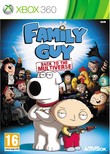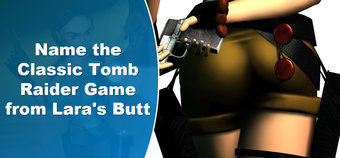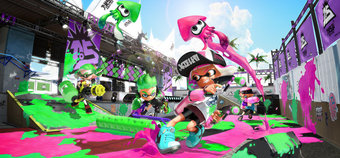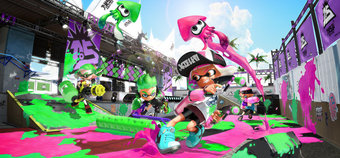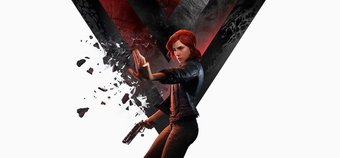For as long video games have existed there has been a desperate attempt to translate many of the properties that have made a name for themselves in the world of television and film into something more interactive. The practice goes back to the dawn of home console gaming, with those familiar with their history being only too aware of the role the awful E.T game played in the demise of Atari, and the video game crash of 1983 that nearly killed the fledgling market.
Fast forward a few more years, and Nintendo saved video games with the Nintendo Entertainment System. Fast forward a few more years and you have the rise of The Simpsons. Bear with us on this, it's important back story.
See, before The Simpsons came along, cartoons were never really considered to be the domain of the adult. They were for Saturday mornings so you could distract the kids on days you couldn't cart them off to school. Matt Groening's creation changed all of that as he created a program that could be enjoyed by all ages, and gave rise to the advent of the prime time cartoon slot that shows like Futurama and Seth McFarlane's Family Guy would later come to inhabit.
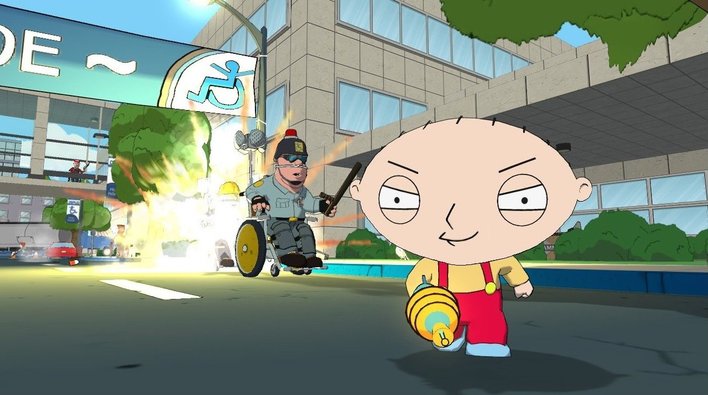
Zzzap.
With The Simpson's explosion in popularity came a whole bunch of games, most of which were pretty awful. However, over the years two have stuck out like sore thumbs and provided exactly what fans of the series wanted from a game. Both The Simpsons Arcade and the Grand Theft Auto alike, The Simpsons: Hit and Run offered fun gameplay experiences without reinventing the wheel, whilst also loading themselves with enough fan service they'd make their fans, and target audience, happy.
We mention this because the formula for a good licensed game is to take a concept, and wrap a decent game around it, whilst ensuring there's plenty for fans of the property to enjoy aside from the game. Not every licensed game can be Goldeneye, so it's the formula that Family Guy: Back to the Multiverse needed to stick to if it didn't want to fall into the wasteland of licensed games gone by.
On the surface the game has the perfect premise. Fans of the show will remember the Multiverse episode as being one of the best in the history of series. The episode entailed semi-evil baby Stewie inventing a device that could transport both he and his talking dog companion Brian to alternate universes, each with their own unique quirks. This led to the duo travelling to a Disney-themed universe, and a universe where dogs owned humans, amongst others. It was brilliant, and acted as a great counterpoint to those who criticised Family Guy as a bunch of random flashbacks and cutaways with a weak story tacked on.
Anyone with a brain cell would be able to notice the potential for a great game here, as the concept is tailor-made for a level based video game. It is so simple to get right. Make a dozen or so levels, each with a different theme, and ensure the game doesn't stink. Lay on the fan service and our previously mentioned formula is complete.
Unfortunately, Family Guy: Back to the Multiverse fails as entertainment on every level it's possible to measure. We could happily shorten the review by telling you the game is an insult to decent video games everywhere and should be forgotten about immediately, but that would be a disservice to you.

Tonight we're gonna party like it's 1983, and we're playing E.T.
So where to begin? Graphics seem like a good enough start, so we'll go with that. Back to the Multiverse uses cel-shading in an effort to convey a cartoon-like atmosphere. It would be a great idea, if games from a generation ago hadn't handily pulled off cel-shading far more triumphantly than this turgid mess. You'll notice lines going askew from the off and the game utterly fails to look the part whenever a camera zooms in for a close-up. Both XIII and The Legend of Zelda: The Wind Waker did this graphical style much, much better than Back to the Multiverse. Both of those games are also a decade old.
Of course, we all know that graphics do not define the game, so let's get back to the first part of our formula; the gameplay. As we mentioned earlier, the Multiverse concept lends itself perfectly to the idea of varying genres intermingling to create a game full of variety - but here, they simply haven't tried. What you get with Back to the Multiverse is shooting. Lots and lots of shooting. Occasionally you may talk to a character or hold a button near something to open the path to more shooting, but rest assured you will always be shooting something.
This wouldn't be so bad if the execution wasn't so naff. The auto-aim barely works. The enemy AI consists of hiding behind an object and shooting or running directly at you for a melee attack. The game increases in both difficulty and hair-tearing frustration by simply ramping up the number of enemies and the accuracy of their projectiles. There is little sense of progression, and you can quite handily make your way through the game using the weapons you started with, assuming you enjoy being constantly killed by a barrage of the exact same enemies in the latter stages of the game.
But Back to the Multiverse's greatest crime is to take one of the best episodes in Family Guy history, one that was filled with variety and humour, and distil it into a game that feels exactly the same no matter how much progress you make, whilst also including writing and "fan service" that takes the worst of what Family Guy has to offer and ramps it up to eleven.
Which brings us to the other important part of our formula - fan service and content. Now we aren't prudes, but Back to the Multiverse is simply offensive. Throughout the course of the game you will travel to universes run by the Amish (you have to kill them), handicapped people (you have to kill them) and pirates (you have to kill them). Each universe will be chock-full of lines taken from the show and lines written solely to offend. Comedy without context is not comedy and, from the moment you hear Lois mention her c-section scar in a very lewd way in the very first level you will realise that this is not a game for kids, adults or the average monkey.
Throughout the course of shooting everything you'll find collectibles and money. The money can be used to upgrade your characters and weapons. There is also a multi-player section to the game. None of these things seem worth mentioning as this title is so woeful that we can't help but think our fingers' time could be better spent elsewhere.
So who is Family Guy: Back to the Multiverse for? Those unfamiliar with the show will hate the title because it is simplistic, derivative and generally pointless in a world where hundreds of better games are vying for our attention. Fans of the show will (hopefully) hate it because it takes every criticism ever levelled at Family Guy and makes a video game out of them whilst offering nothing you can't get from watching the show. People in general will hate it because it is just awful, in every way shape and form. Finally, we hate it because it took a concept with so much potential and utterly wasted it on a puerile game that is of no worth to anybody and should be forgotten as soon as possible.
Format Reviewed: Xbox 360


